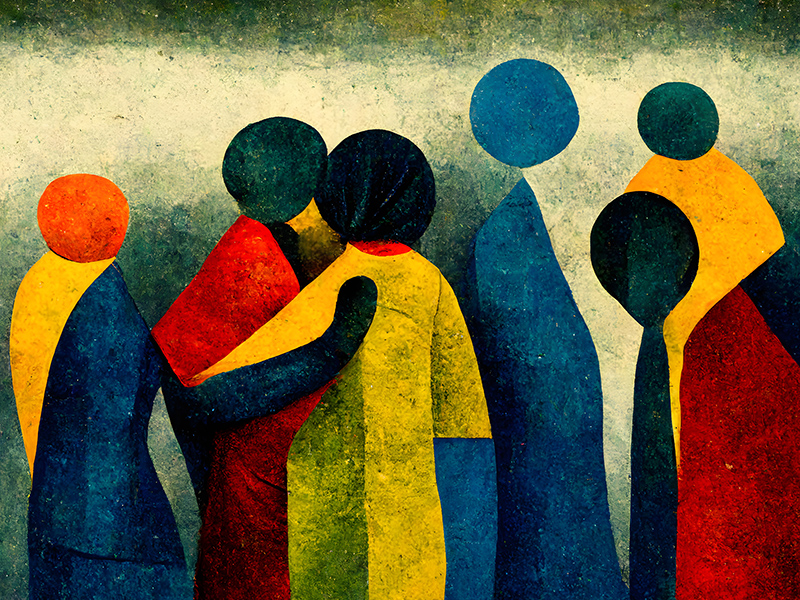Seeking Shalom: Working Toward Just Atonement
A Year of Seeking Shalom

By Rodney Sadler
The LORD spoke to Moses, saying: “When any of you sin and commit a trespass against the LORD by deceiving a neighbor in a matter of a deposit or a pledge, or by robbery, or if you have defrauded a neighbor, or have found something lost and lied about it—if you swear falsely regarding any of the various things that one may do and sin thereby—when you have sinned and realize your guilt, and would restore what you took by robbery or by fraud or the deposit that was committed to you, or the lost thing that you found, or anything else about which you have sworn falsely, you shall repay the principal amount and shall add one-fifth to it. You shall pay it to its owner when you realize your guilt. And you shall bring to the priest, as your guilt offering to the LORD, a ram without blemish from the flock, or its equivalent, for a guilt offering. The priest shall make atonement on your behalf before the LORD, and you shall be forgiven for any of the things that one may do and incur guilt thereby.”
—Leviticus 6:1-7
This Year’s Focus: Seeking Shalom
This year, the fundamental focus of the work of the Center for Social Justice and Reconciliation is on the notion of seeking shalom. This concept was born of conversations within one of the Center’s programs, the Reimagining America Project (R.A.P.). As we began the racial reconciliation work of R.A.P., we noted that, although there was a significant need to attend to the notion of recompense in terms of racial relations, the standard term that is used—“repartions”—is often contested and controversial.
It was in part because of this that one of our consultants, Rabbi Marc Gopin, director of the Center for World Religions, Diplomacy and Conflict Resolution at George Mason University’s Jimmy and Rosalynn Carter School for Peace and Conflict Resolution, suggested we use the biblical terminology of “atonement” to describe what we are seeking with R.A.P. The concept of atonement (a composite word in English from “at-one-ment”) suggests what needs to be done in response to the impact of sin. In essence, if sin causes something to be broken—if relationships are ruptured, if communities are undermined, if something is taken from someone else by theft or fraud or deceit or force—that which was disrupted must be made one again. “At-one-ment” must be made in order to ensure that right relationships can be restored.
This ideal was adopted unanimously by the commissioners of R.A.P. It held two things in tension for us. The first was that there is a need for a sense of reparations, but the concept of reparations far too often is seen only in financial terms. Some things that have been taken cannot be compensated for through financial means. In order to address the racial problems in America, we have to reorganize long-standing systems, know the extent of the disadvantage they have caused, and then reimagine them in new and equitable ways that we will work together to manifest. The concept of atonement is far broader than and void of the ideological baggage of the fraught notion of reparations.
The second was that the benefit of the concept of atonement is that it is deeply theological language. Atonement is not just what people would like; it is what God demands! Atonement holds us all responsible to make right what our actions have made wrong. It takes the concept of obligation from the human realm to the divine realm. It makes redress a divine imperative!
We have been using the term “atonement” for the better part of our three and a half years of work with R.A.P., which led me to conduct further research on the concept in the Hebrew Bible. One of the passages that struck me as significant in this regard comes from Leviticus chapter 6:1-7. In this passage, we can see a number of terms that are used in relationship to the larger concept of atonement. The Hebrew root caphar means “to cover over” the sins that have been committed; i.e., to make them right. Similarly, the term shuv was used, which means “to return” that which was taken. This pericope also used the verbal form shalam, from the noun shalom.
Though shalom more fully understood means “state of wholeness,” we often translate shalom as “peace.” In a very real sense, though, the verb form means “to establish justice.” Most everyone has certainly heard the phrase “No justice, no peace,” which has been popularly used in marches for Black Lives Matter, or in struggles for social justice, or in rallies for peace. This is not just an assertion that “If you don’t give us justice, we won’t give you peace” (i.e., “We will keep coming back, making noise, and causing a commotion”). In a very real sense, if justice (a balancing of the scales, a righting of wrongs, a restoration of wholeness) does not exist, there can be no opportunity for shalom. The verb form of this root suggests restoring a balance that has been broken, righting wrongs that have been done, making whole those who have been fractured by our actions.
The Necessity of Seeking Shalom for Race
As we consider the brokenness of this world, the need for seeking shalom is apparent.
For example, the way that race has functioned in the American context has been a wholesale breaking of people who were deemed “other,” lesser-than, racialized minorities. For the African American community, being deemed racially “black” has meant the legitimation of their being kidnapped, enslaved, murdered, raped, brutalized, subjugated, and second-rated, all without any sense of consequence. Race legitimated a hierarchy of humanity that placed those who imagined themselves to be white at the top of the ladder and those whom they imagined to be black at the bottom of the ladder of human importance. The dominant was thereby able to extract from those whom they had subjugated obedience, labor, property, and fidelity.
In this regard, race can be seen in part as a way of determining who gains access to wealth, power, and privilege in our society—and from whom these benefits are extracted. This was all insured by pseudoscience and twisted biblical hermeneutics; that is to say, our scientific and theological resources were employed in the effort to racialize our nation. The institutions that authorized and manufactured meaning (our academies and our churches) helped perpetuate the false notion of race that ideologically legitimated the supremacist practices of those who imagined themselves to be white and created the actual imbalances in the outcomes.
The result of this hierarchical thinking was evident not only in slavery, and then Jim Crow, and now mass incarceration, but in the systematic disenfranchisement of those who are viewed as black in every sphere of our society. That means that black neighborhoods have historically not only been viewed as inferior, but also often redlined to reduce the acquisition of black wealth by limiting the value of the property they could own. It means that education systems have routinely failed African American students—in spite of Brown v. Board of Education’s calls for equality. It means that our healthcare system has been found to offer black and brown patients a lesser quality of care than it does those who imagine themselves to be white. This has been recently confirmed by the high instances of death among racialized minorities during the COVID-19 pandemic, and it is also why we see maternal mortality at third-world rates for African American women in American hospitals.
Conclusion: Seeking Shalom in Many Spheres
These are just a few simple examples of a much larger problem. If we are to be the nation we claim to be—a nation that “holds these truths to be self-evident that [all human beings] are created equal”—then we have got some work to do! And part of the work we need to do is the work of establishing justice. We have got to repair the breach and fix those things that have been (intentionally?) broken. We have got to make atonement for deliberate harms that come about as a result of our racialized policies. We have got to finally work toward seeking shalom.
But we would be remiss to believe that the status of African Americans in this nation is the only major problem for which we must atone. We need to seek shalom in so many other instances in our society today. We need to seek shalom for those who have been left unhoused in this, the wealthiest nation in the history of the world. We need to seek shalom for the LGBTQ community, whom we have denigrated, cast aside, and denied access to God. We need to seek shalom for the Indigenous American population, whom we have dispossessed and all but eliminated, relegating them to poverty and persistent suffering as we live in “prosperous ease” on their land. We need to seek shalom for immigrants and refugees—those we have demonized and stigmatized, whom God calls us to love as we love ourselves (Leviticus 19:33-34). And we need to seek shalom for Gaza, where the policies we have supported in Israel have left the indigenous Palestinian people under a brutal occupation that has imperiled their lives and the security of our Israeli allies. There is so much shalom we need to seek in order to be the kind of nation we suppose ourselves to be.
So this year we are going to focus our Just Act articles, our Dangerous Dialogues, and even our major lectures around the theme of seeking shalom. We invite you not only to participate in all of our activities, but also to take up this God-ordained, God-commanded Jesus work wherever you may find yourself. After all, it was Jesus who, in John 14:27, said, “Shalom I leave with you; my shalom I give to you.”
May we together seek Jesus’s shalom!
Rodney S. Sadler Jr.’s teaching experience includes courses in biblical languages, Old and New Testament interpretation, wisdom literature in the Bible, the history and religion of ancient Israel, and African American biblical interpretation. His first authored book, Can a Cushite Change His Skin? An Examination of Race, Ethnicity, and Othering in the Hebrew Bible, was published in 2005. He frequently lectures within the church and community on race in the Bible, African American biblical interpretation, the image of Jesus, biblical archaeology, and the Dead Sea Scrolls. He was the managing editor of The African-American Devotional Bible.
Sadler served as a visiting lecturer and interim co-director of the Office of Black Church Studies at Duke Divinity School in Durham, North Carolina, and was an associate minister in Durham. He is the director of the Center for Social Justice and Reconciliation on the Charlotte campus of Union Presbyterian Seminary.

